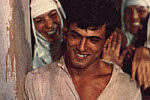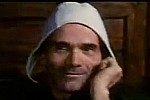 Shadows off the beaten path
Shadows off the beaten pathPasolini's Trilogy of Life: THE DECAMERON
THE CANTERBURY TALES | ARABIAN NIGHTS
< < R E V I V A L S > >
last update 10.Jun.09
See also: SHADOWS FILM FESTIVAL
 R E V I E W B Y R I C H C L I N E
R E V I E W B Y R I C H C L I N E
narr Rita Mae Brown
with Allen Ginsberg, Carroll Davis, Audre Lorde, Smilie Hillaire, Martin Duberman, Barbara Gittings, Evelyn Hooker, Harry Hay, Chuck Rowland, Ann Bannon, Jose Sarria, Richard Bruce Nugent

release US 27.Jun.85,
UK 29.Jun.09
84/US 1h27
TORONTO FILM FEST
BERLIN FILM FEST

 Released to tie in with its 25th anniversary, the most striking thing about this film is how revelatory it is, tracing the history of gay activism. Not only are these stories we never hear about, but America has clearly taken a giant step backwards on this human rights issue.
Released to tie in with its 25th anniversary, the most striking thing about this film is how revelatory it is, tracing the history of gay activism. Not only are these stories we never hear about, but America has clearly taken a giant step backwards on this human rights issue.
Most people believe that the gay movement began with the 1969 Stonewall riots, when New Yorkers finally fought back against the violence and discrimination of the local police. But this film goes much further back to document the changing attitudes toward homosexuality over the previous century, from the free acceptance of the 20s to the violent reactions of the 50s and 60s that sparked the Civil Rights movement and then the events at Stonewall.
Schiller and crew compile the film from a remarkable range of sources, including clips from silent movies, expert interviews, vox pops and personal memories from men and women of various racial backgrounds. The clips are lively and often very funny, especially a hilarious reunion of regulars from the legendary Black Cat club. As it progresses the film outlines some pretty jaw-dropping facts, most notably how World War II drastically altered American attitudes toward gender, as women found independence from the servitude that was born during the Industrial Revolution.
This led to a conservative reaction in the 1950s: McCarthyism was only one aspect of the purge of all people who were considered subversive. But even during this period, people stood up to the authorities. For example, the WAC Johnnie Phelps, who challenged President Eisenhower over his anti-lesbian policies. And it's not surprising that battles heated up at the same time over equality for women, ethnic minorities and homosexuals.
Schiller notes that while researching the film, she found material not filed under "homosexuality" but under "perversion". And it's fascinating to see how optimistic her film is. Stonewall is portrayed as the "we've had enough" moment when a whole community stood up and demanded fair treatment. And the film carries a definite sense that the struggle is already over. In 1984. Although we know 25 years later that real equality is still a dream.
1.Apr.09 llgff
 R E V I E W B Y R I C H C L I N E
R E V I E W B Y R I C H C L I N E MUST
MUST  SEE
Il Decameron
SEE
Il Decameron
with Franco Citti, Ninetto Davoli, Vincenzo Amato, Angela Luce, Giuseppe Zigaina, Gabriella Frankel, Vincenzo Cristo, PP Pasolini, Allievo di Giotto, Giorgio Iovine, Salvatore Bilardo, Vincenzo Ferrigno
 release It 25.Aug.71
release It 25.Aug.71US 12.Dec.71
reissue UK 27.Apr.09
71/Italy 1h47
BERLIN FILM FEST
 Pasolini's colourful Trilogy of Life ambitiously adapts medieval story collections for the screen. This first film is a ribald classic, taking 10 of the 100 stories in Giovanni Boccaccio's epic novel.
The stories take place in 14th century Naples. Andreuccio (Davoli) is a smiley young guy who's robbed and then offered a job robbing a grave in a church, which takes a comically surreal twist. Then there's the farmboy who pretends to be a deaf-mute so he can get work in a convent, where the nuns decide to use him to find out what sex is about. We also meet a ruthless debt collector (Citti) who falls ill and makes an odd deathbed confession. And then there's the painter Gitto (Pasolini) trying to get inspiration for a church fresco.
Pasolini's colourful Trilogy of Life ambitiously adapts medieval story collections for the screen. This first film is a ribald classic, taking 10 of the 100 stories in Giovanni Boccaccio's epic novel.
The stories take place in 14th century Naples. Andreuccio (Davoli) is a smiley young guy who's robbed and then offered a job robbing a grave in a church, which takes a comically surreal twist. Then there's the farmboy who pretends to be a deaf-mute so he can get work in a convent, where the nuns decide to use him to find out what sex is about. We also meet a ruthless debt collector (Citti) who falls ill and makes an odd deathbed confession. And then there's the painter Gitto (Pasolini) trying to get inspiration for a church fresco.
All of this is linked through Pasolini's attitudes toward the church as an archaic institution and sex as something pure and natural. These ideas are strongest in stories of two brothers who vow to return after death to tell the other whether sex is a mortal sin; when the promiscuous one dies and says that sex isn't an issue in heaven, the pious one repents of his celibate ways. There are also two stories that mix sex with culture, as families react very differently when daughters are caught sleeping with a wealthy boy or a poor apprentice.
Pasolini builds a lively and energetic tone, with cheeky situations and vivid characters who tease, taunt, flirt and laugh. It's a colourful collection of faces too--young and old, rich and poor, beautiful and ugly. And each story is packed with observations on the economic divide. Yes, Pasolini's radical politics fill each scene, and he weaves together the various stories beautifully, giving us a remarkable sense of the time and place.
In the end, it's more of a gleefully honest comment on human nature than a historical piece. Pasolini's approach to sexuality is fresh and provocative, as attraction knows no social boundaries. Nuns and priests are as fallible as anyone. The poor classes may not have such high moral standards (read: hypocrisy), but they are happier and more human as a result. No wonder the Catholic Church hated this film.
22.Apr.09
 R E V I E W B Y R I C H C L I N E
R E V I E W B Y R I C H C L I N E I Racconti di Canterbury
I Racconti di Canterbury
with Hugh Griffith, Laura Betti, Ninetto Davoli, Franco Citti, Josephine Chaplin, Pier Paolo Pasolini, Alan Webb, JP Van Dyne, Vernon Dobtcheff, Oscar Fochetti, Tom Baker, Robin Askwith
 release It 2.Sep.72,
release It 2.Sep.72, US 30.May.80
reissue UK 27.Apr.09
72/Italy 1h47
BERLIN FILM FEST
 This second in Pasolini's Trilogy of Life tells eight stories from Geoffrey Chaucer's novel, adopting a more uneven, farcical tone to poke fun at the British attitudes toward sex as something naughty but necessary.
This second in Pasolini's Trilogy of Life tells eight stories from Geoffrey Chaucer's novel, adopting a more uneven, farcical tone to poke fun at the British attitudes toward sex as something naughty but necessary.
The tales are only linked by brief clips of Chaucer (Pasolini) writing while his wife nags him to keep working. The stories all deal with errant lustiness, as brides flirt with strange young men, boys compete with each other for women and end up scarred for life, a domineering woman (Betti) marries her fifth husband (Baker) but has trouble controlling him. In one of the most telling sections, monks spy on men having sex with other men, then blackmail them in a cash-for-absolution scam. And in the final insult, a monk caught sleeping with a giant marrow is taken to a lurid vision of hell.
Unlike The Decameron, this film doesn't have a coherent tone or an overall point to make. The stories feel disjoined and distinct, but each one has a little hook to it that makes it entertaining. The stand-out sequence, which really doesn't fit in at all, is a Chaplin pastiche starring Pasolini regular Davoli as a cheeky young cook who embarks on a fast-motion slapstick adventure that's full of witty sight gags but has no real punchline. That said, the film has a jolly, hammy atmosphere and makes wonderful use of some amazing locations and lavish costumes (plus rather cheesy set decoration).
The cast is quite good, although the dubbing into Italian is pretty terrible (the English version on the special edition DVD is much better). And Pasolini gives the film a rowdy, vulgar sensibility, with constant nudity, bodily functions and of course raucously natural sex ("If God made it so much fun, how can it be a sin?"). But of course, being set in Britain, the each character is both preoccupied by sex and embarrassed by it--thoroughly disapproving, but always at it.
25.Apr.09
 R E V I E W B Y R I C H C L I N E
R E V I E W B Y R I C H C L I N E MUST
MUST  SEE
Il Fiore Delle Mille e Una Notte
SEE
Il Fiore Delle Mille e Una Notte
with Ninetto Davoli, Franco Citti, Franco Merli, Tessa Bouche, Ines Pellegrini, Margaret Clementi, Luigina Rocchi, Alberto Argentino, Francesco Paolo Governale, Salvatore Sapienza, Zeudi Biasolo, Barbara Grandi
 release It 20.Jun.74,
release It 20.Jun.74, US 27.Jul.80
reissue UK 27.Apr.09
74/Italy 2h05
 Taking a handful of the nearly 500 Arabian Nights stories, Pasolini wraps up his Trilogy of Life with this warm, witty and sumptuously filmed series of romantic dramas. Twisty and seductive, the film is thoroughly engaging.
Taking a handful of the nearly 500 Arabian Nights stories, Pasolini wraps up his Trilogy of Life with this warm, witty and sumptuously filmed series of romantic dramas. Twisty and seductive, the film is thoroughly engaging.
Framing the film is the tale of the wilful slave Zumurrud (Pellegrini) who sells herself to a virginal young master, Nur Ed Din (Merli), who then disobeys her by selling a tapestry to a thief. As a result, they are separated: Zumurrud is captured by thieves, escapes and ends up masquerading as the king of a distant city, while Nur Ed Din has his own adventures while searching for her. Along the way we hear stories from the people they encounter--sometimes with flashbacks within the stories.
Each episode is a miniature morality tale in which fate plays an important role. Aziz (Davoli) can't decide between his intended (Bouche) and a seductive princess and ends up in big trouble. Shahzmah (Argentino) is chased by a demon (Citti) who kills his beloved and turns him into a poetry-writing chimp. Yunan (Sapienza) is called to a momentous sea journey that involves actions he can't dream of. All of these stories are told with an open-faced joie de vivre that includes sassy dialog, pointed interaction and constant twists in the tales, right to the almost unbearably sweet conclusion.
Pasolini matches the richness in the stories with gorgeous location work. Shot in Ethiopia, Yemen, Iran and Nepal, the settings are absolutely magnificent, with hundreds of extras that give the film an almost documentary feel even as the stories reveal comedy, tragedy, love and pain. It's also both sexy and violent, once again commenting on the raw power of nature as people come together in a variety of ways.
The way Pasolini immerses us completely into this world is magical, and helps overcome the clunky dubbing and dodgy (even for 1974) effects. We almost get lost in the tightly woven web of stories as we fall deeper and deeper into them, utterly gripped by each situation and knowing that we will end up back where we began. All while understanding that fate and justice are outside the control of mere humans.
28.Apr.09


See also: SHADOWS FILM FESTIVAL
© 2009 by Rich Cline, Shadows
on the Wall